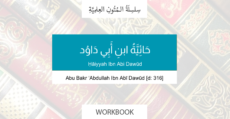Reference: Fadl ‘ilm as-Salaf ‘alā al-khalaf; page 9
Ibrāhīm an-Nakha’ī said,
I have never debated and quarrelled.
‘AbdulKarīm al-Haurī said,
A pious devout person never quarrels or debates.
Ja’far Ibn Muḥammad said,
Be aware of debating and quarrelling regarding the religion; it occupies the heart and results in hypocrisy.
‘Umar Ibn ‘AbdulAzīz used to say
If you hear of argumentative debating, stay away.
He said,
Whoever exposes his religion [to needless disputes] will severely burden himself.
He also said,
The early generation [of Muslims] held back [from delving into this] out of knowledge, and with insight they withheld; they were more than capable of investigating had they chosen to do so. The statements of the Salaf on this matter are numerous.
Many of the latter generations have been tested with this, they think that a person who speaks, argues and debates a lot regarding religious matters – he is more knowledgeable than a person who does not do this. This is pure ignorance.
Look at the senior Companions and their scholars such as Abu Bakr, ‘Umar, ‘Alī, Mu’ādh, Ibn Mas’ūd and Zayd Ibn Thābit; look at how they were; their speech was less than Ibn ‘Abbās and yet they were more knowledgeable than him.
Also, consider how the speech of the Tābi’īn was more than the speech of the Companions and yet the Companions were more knowledgeable than them.
Also, the speech of the Atbā’ at-Tābi’īn was more than the speech of the Tābi’īn, and yet the Tābi’īn were more knowledgeable than them.
Knowledge is not based on narrating a lot nor speaking much, rather it is light which is placed in the heart. A person is able to understand the truth through this light, and differentiate between truth and falsehood; he is able to speak about the truth with short concise statements which meet the intended objective.
The Prophet ﷺ was given the ability to say a few words containing many deep meanings; he was given the ability to make very concise statements. For this reason, there is a prohibition against speaking a lot and spreading hearsay.
العنوان: ليس العلم عن كثرة الكلام والجدال
المرجع: فضل علم السلف على الخلف
وقال إبراهيم النخعي: “ما خاصمت قط.”
وقال عبد الكريم الحوري: “ما خاصم ورع قط.”
وقال جعفر بن محمد: “إياكم والخصومات في الدين فإنها تشغل القلب وتورث النفاق.”
وكان عمر بن عبد العزيز يقول: “إذا سمعت المراء فاقصر.”
وقال: “من جعل دينه عرضاً للخصومات أكثر الثقل.”
وقال: “إن السابقين عن علم وقفوا وببصرنا قد كفوا وكانوا هم أقوى على البحث لو بحثوا وكلام السلف في هذا المعنى كثير جداً.”
وقد فُتن كثير من المتأخرين بهذا فظنوا أن مَن كثر كلامه وجداله وخصامه في مسائل الدين ، فهو أعلم ممن ليس كذلك ، وهذا جهل محض ، وانظر إلى أكابر الصحابة وعلمائهم ، كأبي بكر وعمر وعلي ومعاذ وابن مسعود وزيد بن ثابت كيف كانوا ، كلامهم أقل من كلام ابن عباس ، وهم أعلم منه، وكذلك كلام التابعين أكثر من كلام الصحابة، والصحابة أعلم منهم، وكذلك تابعوا التابعين، كلامهم أكثر من كلام التابعين، والتابعون أعلم منهم.
فليس العلم بكثرة الرواية ، ولا بكثرة المقال ، ولكنه نور يقذف في القلب ، يفهم به العبد الحق ، ويميز به بينه وبين الباطل ويعبر عن ذلك بعبارات وجيزة محصلة للمقاصد.
وقد كان النبي ﷺ أوتي جوامع الكلم ، واختُصر له الكلام اختصارا ، ولهذا ورد النهي عن كثرة الكلام ، والتوسع في القيل والقال.




